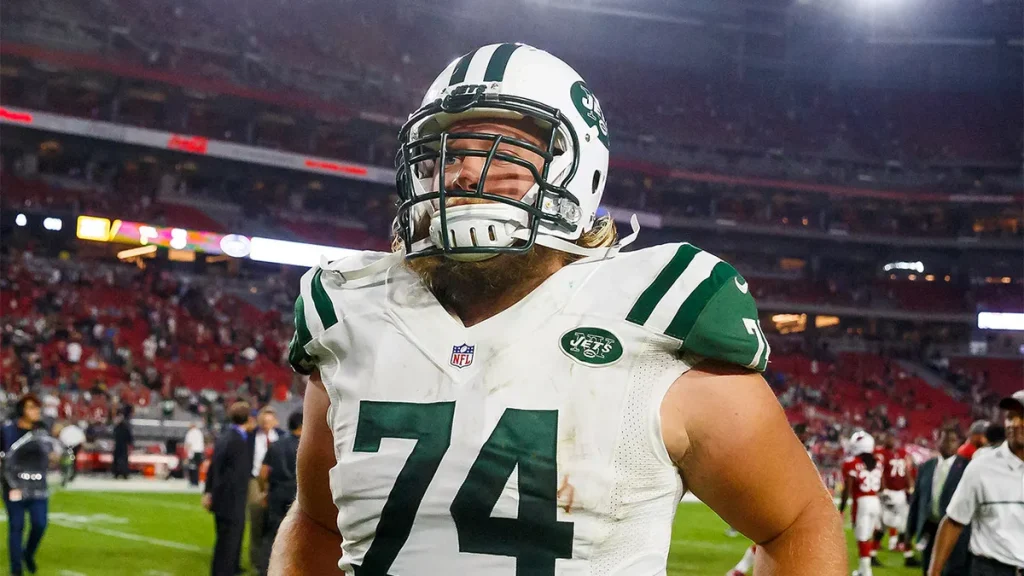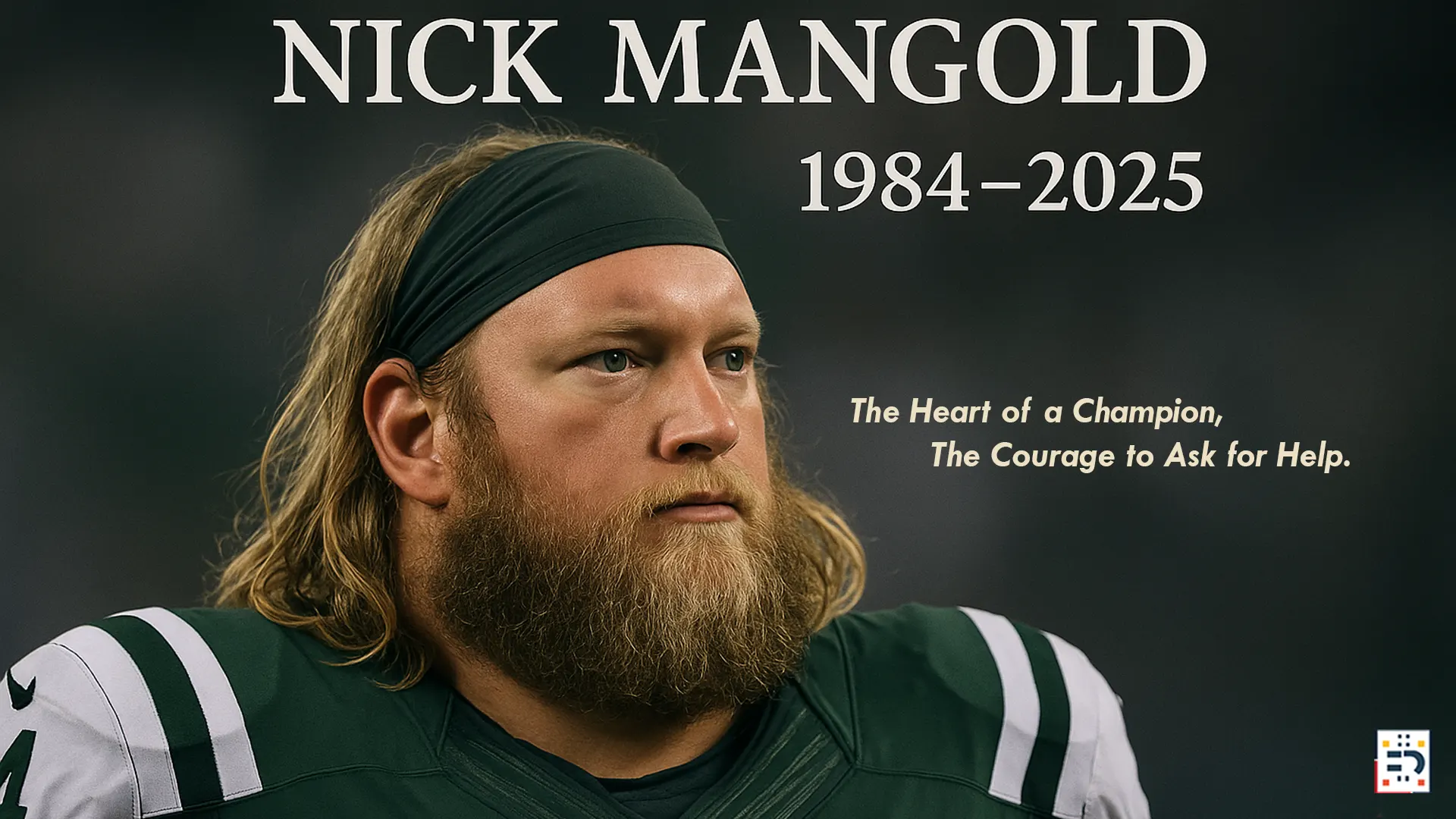Breaking News: The football world mourns the loss of New York Jets legend Nick Mangold, who passed away Saturday night, October 26, 2025, at age 41 from complications of chronic kidney disease—just 12 days after making a public plea for a kidney donor on social media.
The Heart of a Champion: Nick Mangold’s NFL Legacy
Nick Mangold was never one to back down from a challenge. From the moment the New York Jets selected him 29th overall in the 2006 NFL Draft out of Ohio State University, the Centerville, Ohio native embodied the blue-collar toughness and every-man personality that made him an instant fan favorite at MetLife Stadium. His bearded face, typically topped with a backward baseball cap, became iconic in New York sports history.
But the Jets center’s legacy extends far beyond his physical presence on the football field. During his 11 seasons with the Jets—all spent in green and white—Mangold earned an impressive array of accolades that cemented his status as one of the greatest centers in NFL history.
Pro Bowl Selections (2008-2011, 2013-2015) – 7x
First-Team All-Pro (2009-2010) – 2x
Games Started in 176 Played – 164
Seasons with New York Jets – 11
Jets Vice Chairman Christopher Johnson captured the essence of Mangold’s impact: “Nick was the embodiment of consistency, strength, and leadership. For over a decade, he anchored our offensive line with unmatched skill and determination, earning the respect of teammates, opponents, and fans alike.”

A Silent Battle: 19 Years Living with Chronic Kidney Disease
What makes Nick Mangold’s story even more remarkable—and ultimately tragic—is what fans didn’t know. On October 14, 2025, Mangold broke his silence about a fight he’d been waging privately for nearly two decades. In a heartfelt Instagram message addressed to “My NY Jets community,” he revealed that in 2006—the same year he was drafted by the Jets—he was diagnosed with a genetic defect that led to chronic kidney disease.
“After a rough summer, I’m undergoing dialysis as we look for a kidney transplant. I always knew this day would come, but I thought I would have had more time.” — Nick Mangold, October 14, 2025
The timing was cruel beyond measure. The same year that launched his professional football career also marked the beginning of a medical journey he knew would one day require intervention. For 19 years, the Jets offensive lineman lived with this knowledge, playing through pain, excelling at the highest level of professional sports, all while carrying the weight of his diagnosis.
“Unfortunately, I do not have any family able to donate at this time, so this is why I’m reaching out to you, our NY Jets and Ohio State communities,” Mangold continued in his social media post, asking for living kidney donors with type O blood to come forward through Columbia Surgery.
The Power of Vulnerability in Professional Sports
In an era where professional athletes are often expected to project invincibility, Nick Mangold’s decision to share his struggle publicly was an act of profound courage. He didn’t have to tell anyone about his kidney disease battle. He could have searched for an organ donor quietly, protected his privacy, maintained the tough-guy image that defined his playing career as a Jets center.
Instead, he chose vulnerability—a decision that would ultimately spark a national conversation about organ donation awareness.
“This isn’t an easy message to share, but I want to be open about what’s been happening with me and my health,” Mangold wrote on social media. That openness, that willingness to ask for help, revealed the true measure of the man—not in his physical strength on the football field, but in his emotional courage off it.
Former Jets head coach Rex Ryan, visibly emotional on ESPN’s “Sunday NFL Countdown” upon learning of Mangold’s passing, shared a memory that perfectly captured his character:
“I remember it was obvious I was getting fired. My last game, Mangold’s injured—like, injured. He comes to me and says, ‘I’m playing this game.’ He wanted to play for me. That’s what I remember about this kid. He was awesome and just way too young.” — Rex Ryan, ESPN Analyst
America’s Organ Donation Crisis: The Numbers Behind the Tragedy
Nick Mangold’s story shines a harsh light on America’s organ donation crisis. The statistics are staggering and paint a picture of a healthcare system struggling to meet the needs of thousands of Americans waiting for life-saving transplants.
2024-2025 U.S. Organ Donation Statistics
- 104,753 people currently waiting for organ transplants in the United States (as of December 2024)
- 89,977 people specifically waiting for kidney transplants—representing 86% of all candidates
- 13 people die each day waiting for an organ transplant across America
- Every 8 minutes another person is added to the national transplant waiting list
- 48,149 transplants were performed in 2024, a 3.3% increase from 2023
- 27,759 kidney transplants were completed in 2024, up 1.6% from the previous year
- Average wait time: 3.6 years for a first-time kidney transplant recipient

According to the United Network for Organ Sharing (UNOS), more than 90,000 people are currently waiting for kidney transplants in the United States. The wait times are staggering and vary dramatically based on blood type, geographic location, and other factors. Patients can wait anywhere from several months to over five years for a kidney. For Nick Mangold, time tragically ran out just days after his public appeal for a kidney donor.
Understanding Kidney Disease Demographics
Chronic kidney disease disproportionately affects certain populations in America. According to the National Kidney Foundation, African Americans are three times more likely to experience kidney failure than white Americans, while Hispanic Americans are 1.3 times more likely. This disparity has led to increased focus on organ donation awareness within minority communities.
In 2024, transplants for racial and ethnic minority groups increased significantly. Hispanic/Latino recipients received 9,097 transplants (a 6.5% increase), while Black non-Hispanic recipients received 10,990 transplants (up 1.5%). These improvements represent progress in addressing health equity issues, though significant gaps remain.
The Jets Family Responds: A Community in Mourning
The response to Nick Mangold’s October 14 plea was immediate and overwhelming. Jets fans, Ohio State Buckeyes supporters, and people who’d never met him flooded Columbia Surgery’s transplant center website to inquire about living kidney donation. Social media exploded with messages of support, with former teammates, coaches, and fans sharing his appeal using hashtags like #SaveMangold and #OrganDonation.
But organ matching, medical testing, and transplant preparation take time—precious time that Mangold, tragically, didn’t have.
“Nick was more than a legendary center. He was the heartbeat of our offensive line for a decade and a beloved teammate whose leadership and toughness defined an era of Jets football. Off the field, Nick’s wit, warmth, and unwavering loyalty made him a cherished member of our extended Jets family.” — Woody Johnson, New York Jets Owner
The New York Jets announced Mangold’s death just one hour before their Sunday game against the Cincinnati Bengals—in Cincinnati, just 45 miles from Mangold’s hometown of Centerville, Ohio. In a cruel twist of irony, it was also against Cincinnati that the Jets faced when Mangold was inducted into the Jets Ring of Honor in September 2022.
More Than Football: Nick Mangold’s Life Beyond the NFL
After the Jets released him in February 2017 following 11 seasons, Nick Mangold could have simply faded into comfortable retirement. The Baltimore Ravens expressed interest in signing the veteran center, but Mangold chose to retire in April 2018 after spending more than a year away from the game he loved.
Instead of leaving football behind entirely, Mangold became an assistant football coach at Delbarton School in Morristown, New Jersey, choosing to give back to his local community and the sport that had given him so much.
Mangold on Coaching: “You get to mold boys into men and teach the game of football—but also teach them a little bit about life as you go along,” Mangold told the New York Post in 2024. Even while battling his disease, he was investing in the next generation of young athletes in New Jersey.
Mangold was inducted into the New York Jets Ring of Honor in 2022, alongside fellow offensive tackle D’Brickashaw Ferguson and cornerback Darrelle Revis. At his halftime ceremony that September at MetLife Stadium, the bearded legend delighted the crowd by cracking open a beer—a perfectly on-brand moment that had the stadium roaring with affection and perfectly captured his relatable, every-man persona.

From Ohio State to NFL Stardom
Before anchoring the Jets’ offensive line, Mangold built his reputation at Ohio State University, where he was a three-year starter at center for the Buckeyes. He logged over 300 minutes of play in each of his last three college football seasons, earning All-Big Ten Honorable Mention in 2004 and second-team honors in 2005, finishing with 33 starts in 45 games.
His consistency and football IQ at Ohio State laid the foundation for his first-round selection in the 2006 NFL Draft. Known for arriving at college with a rare mastery of the center position, Mangold was compared to All-American LeCharles Bentley for his technique and leadership—high praise in the world of offensive line play.
Understanding Kidney Transplants and Living Donation
The tragedy is that kidney donation is one of the most straightforward forms of organ donation, yet the gap between need and supply continues to grow across America. Living donors can give one kidney and live full, healthy lives with the remaining kidney, making living kidney donation an increasingly important option for patients on the transplant waiting list.
Living Donor Kidney Transplant Facts
- 7,030 living donors enabled transplants in 2024—the second-highest annual total in U.S. history
- Over 90% of living donor transplants are kidney transplants
- Living donor kidney transplants have better outcomes than deceased donor transplants
- Donors typically recover within 4-6 weeks and can return to normal activities
- Living donors can live normal, healthy lives with one kidney
- Average hospital stay for living kidney donors is 2-3 days
Source: OPTN and National Kidney Foundation
In 2024, deceased organ donors enabled 41,119 transplants, marking the first year the threshold of 40,000 deceased donor transplants was surpassed in American medical history. This represents a 3.6% increase over 2023, with deceased donor transplants setting new annual records for 12 consecutive years.
A Legacy Beyond the Line: Remembering Nick Mangold
Nick Mangold leaves behind his wife, Jennifer (his high school sweetheart whom he married in April 2007), and their four children: Matthew, Eloise, Thomas, and Charlotte. The family lived in Chatham, New Jersey during his playing days and moved to Madison, New Jersey after his retirement from the NFL, where Mangold coached youth football and remained deeply involved in the local community.
But perhaps his most important legacy is the conversation he sparked in his final days—about organ donation awareness, about asking for help when you need it, about the courage it takes to be vulnerable when you’re known for being tough as a professional athlete.
“This situation has reminded me how lucky I am to have such an amazing family, friends, and community behind me. While this has been a tough stretch, I’m staying positive and focused on the path ahead. I’m looking forward to better days and getting back to full strength soon.” — Nick Mangold, October 14, 2025 (Final Public Statement)
Those better days never came. But his message endures, and his courage in sharing his story publicly has already inspired thousands of Americans to register as organ donors and learn more about living kidney donation.
Hall of Fame Consideration
Nick Mangold is among 52 modern-era candidates currently being considered for induction into the Pro Football Hall of Fame in Canton, Ohio. His credentials—seven Pro Bowl selections, two First-Team All-Pro honors, 164 starts over 11 seasons, and recognition as one of the NFL’s best centers for nearly a decade—make him a strong candidate for football’s highest honor.
Former Jets quarterback Ryan Fitzpatrick told ESPN on Sunday: “Nick was a great man in every aspect… an all-time teammate and a great friend… heartbroken for his family.”

How You Can Honor Nick Mangold’s Memory and Save Lives
If Nick Mangold’s story moves you, consider taking these life-saving steps to combat the organ donation crisis in America:
- Register as an Organ Donor: Visit organdonor.gov to add yourself to the national organ donor registry. One organ donor can save up to 8 lives and enhance 75 more through tissue donation. Currently, 170 million Americans are registered donors, but more are desperately needed.
- Consider Living Kidney Donation: Healthy adults between 18-60 can donate a kidney and live normal lives. Visit the National Kidney Foundation or contact your local transplant center to learn about the living donor kidney transplant process and whether you qualify.
- Talk to Your Family: Make sure your loved ones know your wishes regarding organ donation. According to surveys, 90% of American adults support organ donation, but only 60% are actually registered as donors. Family discussions about organ donation can help close this gap.
- Spread Awareness on Social Media: Share information about the organ donation crisis using hashtags like #OrganDonation, #BeAnOrganDonor, #KidneyTransplant, and #NickMangold. Every conversation about organ donation could save a life on the transplant waiting list.
- Support Transplant Organizations: Organizations like the National Kidney Foundation, Donate Life America, and UNOS work to increase organ donation rates, support patients with kidney disease, and improve the transplantation system in the United States.
- Learn Your Blood Type: Knowing your blood type is the first step in determining if you could be a living kidney donor. Type O donors (like what Nick Mangold needed) are especially in demand as universal donors who can help patients with any blood type.
- Support Kidney Disease Research: Donate to organizations researching chronic kidney disease prevention, treatment, and genetic kidney disorders. Early detection and treatment can slow disease progression and reduce the need for transplants.
Every 8 minutes, another person is added to the organ transplant waiting list. Every day, 13 people die waiting. You can be part of the solution.
The Game Goes On: Jets Win for Mangold
Hours after news of Mangold’s passing, the New York Jets rallied past Cincinnati for their first win of the 2025 season. Ever the competitor, Nick Mangold would have smiled knowing his team fought hard and won on the day he was lost.
Nick Mangold was more than a center — he was the heartbeat of the Jets franchise for over a decade. He was also a devoted father and husband, and a mentor to young athletes across New Jersey. He approached his greatest challenge with the same strength and openness that guided him throughout his football career.
His final message to the world wasn’t about Pro Bowl selections, All-Pro honors, or Ring of Honor inductions. It was a simple, profoundly human plea: I need help. By asking for help publicly, he gave one final gift to the New York community he so deeply loved. It was a reminder that we’re in this together — that strength comes from vulnerability and the courage to ask.
Organ Donation & Kidney Disease Resources
- Register as an organ donor: organdonor.gov
- National Kidney Foundation: kidney.org or call 1-855-653-2273
- United Network for Organ Sharing (UNOS): unos.org
- Donate Life America: donatelife.net
- Living Donor Information: National Kidney Foundation Living Donors
- OPTN Transplant Data: optn.transplant.hrsa.gov
- New York Jets Official Site: newyorkjets.com
- Pro Football Hall of Fame: profootballhof.com
Rest in peace, Number 74. The heartbeat of the New York Jets will be felt for generations to come. Your courage in your final battle will save countless lives through increased organ donation awareness across America.
Frequently Asked Questions About Organ Donation
How do I register as an organ donor in the USA?
Visit organdonor.gov and select your state to register online. You can also register when renewing your driver’s license at your local DMV. Registration takes less than 5 minutes and could save up to 8 lives.
Can I be a living kidney donor?
Most healthy adults between 18-60 years old can potentially become living kidney donors. The process involves medical testing, psychological evaluation, and surgical recovery of 4-6 weeks. Contact the National Kidney Foundation or a transplant center near you for more information about living kidney donation.
How many people are waiting for kidney transplants in America?
In December 2024, nearly 90,000 Americans were on the kidney transplant list, making up 86% of all candidates. The average wait time is 3.6 years, though this varies significantly by blood type, location, and other factors.
What are the symptoms of chronic kidney disease?
Early-stage chronic kidney disease often has no symptoms. As the disease progresses, symptoms may include fatigue, swelling in legs and ankles, changes in urination, nausea, and difficulty concentrating. If you have risk factors like diabetes, high blood pressure, or family history of kidney disease, regular screening is crucial. Consult the National Kidney Foundation for more information.
How did Nick Mangold contribute to the New York Jets?
From 2006 to 2016, Nick Mangold anchored the Jets’ line, earning seven Pro Bowls and two All-Pro selections. He started 164 of 176 games and was inducted into the Jets Ring of Honor in 2022. Regarded as one of the NFL’s all-time great centers, he’s now up for the Pro Football Hall of Fame.
What is the difference between living and deceased organ donation?
A living donation occurs when a healthy person donates a kidney or part of another organ while still alive. Deceased donation occurs after a person dies and has registered as an organ donor. In 2024, there were 7,030 living donor transplants and 41,119 deceased donor transplants in the United States. Living donor kidney transplants generally have better outcomes and don’t require waiting on the transplant list.
Take Action Today
In honor of Nick Mangold’s legacy and courage, please consider taking one of these actions today:
- Register as an organ donor at organdonor.gov
- Share this article with 3 friends or family members
- Learn about living kidney donation eligibility
- Check your driver’s license for organ donor status
- Discuss organ donation wishes with your family
- Donate to kidney disease research organizations
Every decision to become an organ donor has the potential to save 8 lives. Be someone’s hero today.
#NickMangold #OrganDonation #NewYorkJets #KidneyTransplant #BeAnOrganDonor #ChronicKidneyDisease #NFL #JetsNation #OhioState #DonateLife


